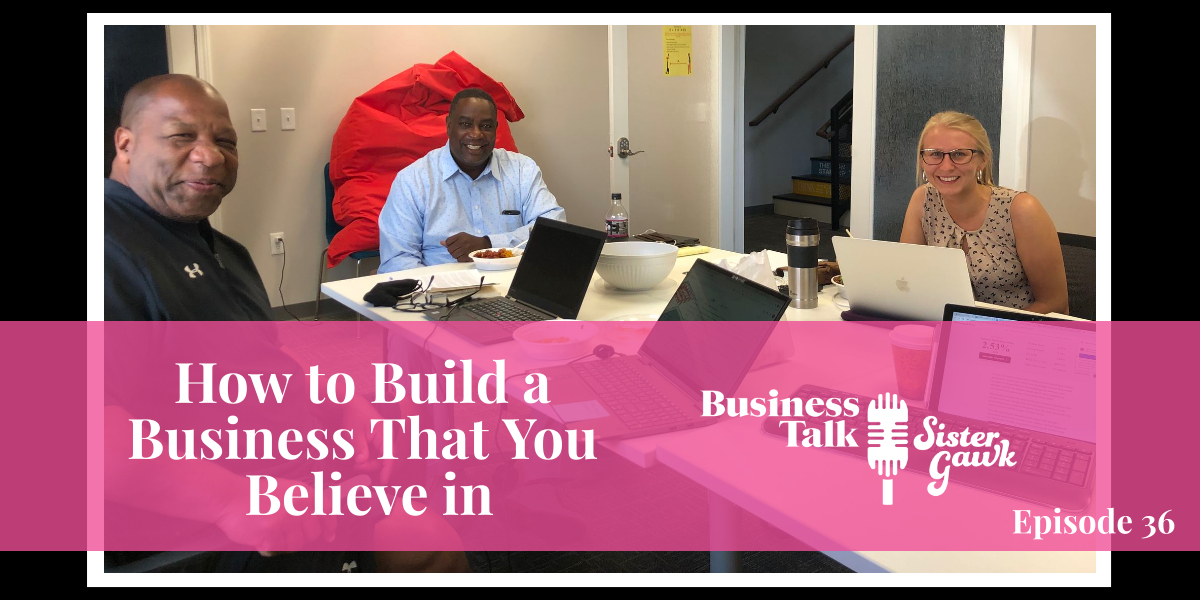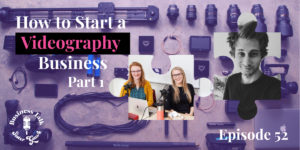Welcome to Business Talk Sister Gawk! I’m Bekkah! And I’m Ruthie!
Bekkah: And today we get the opportunity to speak to someone super awesome. The title of our episode is “How to Build A Business That You Believe In.” We have Keith Turner with us from The Promises Is You and he is going to tell us all about what he does and all of that. Just for context, everybody, I’ve been following Keith a little bit in his journey through this semi-recently, not as far back as he started off, but we’re going to hear a lot about that today. Thanks so much for being here with us!
Keith: Well, thank you, Bekkah. Thank you, Ruthie, for having me today. I am really excited to have the opportunity to have a conversation with you this afternoon.
Ruthie: Yeah we’re excited to have you!
How Does Your Business Help Address Problems?
Bekkah: Yeah! Our first question for you is what do you do?
Keith: What do I do? So my business partner and I, Carl Crawford, started a consulting business and our first our main focus was more towards athletics and athletic teams. Then, if the folks out there know what the VAWA Act is the Violence Against Women Act. We were talking to mostly student-athletes male and female about dating violence and appropriate behavior on campus and off-campus and just knowing when “no” means “no”. That’s kind of where we started and then that has spun off into some things that we are really passionate about; that is diversity and inclusion and equal justice.
Ruthie: And how did you get started with that? Like what was your passion driving that?
How Did You Get Started Working to Address Diversity, Inclusion, & Equal Justice with Your Business?
Keith: So most of it is because I have two daughters and Carl has one daughter and it was knowing that our daughters are out, you know, in that age of dating and getting to know partners and we just really wanted to try to educate young people. Both of us have coached collegiately and high school wise. My passion for coaching college football for over 30 years really drove me to really keep educating young people on this topic.
Bekkah: Wow! So you mentioned you guys have kind of started there, how do you do what you do? Can you tell us about that?
Keith: Yeah so what we do is a lot of times folks will reach out to us or we’ve been reaching out to different colleges and high schools and different organizations. What we do is we try to come in and not do that one time feel where what we call “you get a hat and a t-shirt and you check a box.” We try to do a progressive approach where we go in and we really try to get a connection and get students to understand that we’re there not for a one-time service, we’re there to continuously help educate them on these different topics. We try to make sure we go in, we give a presentation.
Most of the time our presentations are two and a half to three hours and then we do a follow-up within the next six to eight weeks with those same athletic teams or the different organizations we’re working with. Then we do another deep dive of how is that going to change your organization, change your dynamics of your sports team, and then what are you putting together as far as your strategic plan and looking at your mission moving forward?
Ruthie: Wow! That all sounds really intimidating! Obviously, this is a huge issue and I can really hear your heart and not just wanting that for the world but specifically for your family too and kind of implementing that and teaching people about that so when you look at a big problem like violence in a broad term. How do you know where to start? What was your first like, “Okay, this is what our first step is going to be to fight this?”
What Was Your First Step in Addressing a Big Problem Like Violence?
Keith: One of the main things was going back off of our past history. I have some experience with, like I said before, coaching college football and Carl coaching high school basketball and college basketball. We went back off of our experience working with different situations that have come up. Along with that going, “Okay, what could we have done or have talked about to try to prevent this from happening to some of these student-athletes? And what are the precautions we could have coaches, counselors, and even faculty members take to help these young men and young women through it?” That was kind of our starting point of understanding exactly where we were at as far as our past experiences and then moving from there.
How Did You Identify Your First Audience for Your Business?
Ruthie: Who was your first audience? You were like, “Okay, we’re gonna move forward with this!” And then who did you kind of approach first?
Keith: Our first audience were some coaches that I knew. If you’ve been in athletics the coaching field is a really tight network so I just reached out to some of my former colleagues and said, “Hey, these are the things that we want to talk to not only your staff about but then move into your teams.” And a lot of it was because I worked in rural Minnesota in the two-year system.
I talked to the coaches about, “Okay, who are you recruiting? What does that look like for them, especially, if they’re students of color or if they’re coming from a metropolitan area? What did that looks like coming into a community that may only have a 5,000 population for them? And then how do you want them to get acclimated to not only college but living on their own in a rural community? Those were some of the main things that I don’t want to say sold, but what we told them that we would help them with.
Bekkah: Yeah and I know from previous conversations that we’ve had and Ruthie this is the first time Ruthie’s meeting you so she’s not –
Ruthie: Nice to meet you!
How Are You Using Your Business to Address Issues College Students Face in Rural America?
Bekkah: There’s lots of stuff going on in this and Keith has so many cool things that he’s doing! Oh, it’s so exciting! One of the things that I think really stuck out to me in what you mentioned is you’re seeing this concept of “come to school to get a degree, not a felony.” I never even thought of that before! I was like, “That’s a thing!?” Can you just speak to that and what that looks like and how you guys are really trying to address that issue? Because I think that’s a huge problem that a lot of people aren’t even aware of.
Keith: I’m originally from Cleveland, Ohio. Carl’s originally from South Central Los Angeles and we talked about, “Okay, what did that look like when we came out of our communities and came to college?” We wanted to educate young men and women on that because when they get into some of these communities not knowing some of the past history and the backgrounds you could get caught up in some different things that would give you a felony. Hence came out the title of our company The Promise Is You.
We always said, “The promise was us,” because we went to college and our families were looking for us to be successful. That’s why they were helping us move forward. We understand, too, that when a young person comes to college it’s not just them it’s their parents, their grandparents, and sometimes their siblings who are really helping support them and pushing them forward to make sure that they graduate and they gain the skills that they want to get into their profession. Making sure that we talk to young people and let them know that one mistake of using drugs or maybe even selling drugs or one night of drinking and understanding that “no means no”, both of you are intoxicated, can change your whole career path and essentially change your whole life in just a few hours.
How Did You Use Networking With Your Business?
Ruthie: Wow! Yeah, so you’re seeing this problem on a small scale and a big scale on an individual basis. I just keep thinking, how did – just hearing your heart in that and in all of where you’re at now, how did you network? How did you do the research? How did you decide, “Okay, consulting is where we’re going to go with this? Touch on those things. What did your networking look like? Who did you reach out to first in your researching process?
Keith: When we started, we went to a lot of different I guess you would say “trainings” that the folks were putting on and we saw what we liked. We took what we liked and we didn’t like. We weren’t stealing their content but we were looking at how presenters present it or if it was just what we talk about as “talking heads”. We’re gonna talk to you for two and a half hours and then you’re gonna leave and go. You’re trained and ready to go.
It was like, no! We want people to be interactive. We want them to share their stories with you with each other because most of the folks that are in our training are folks that have worked together for several years and they have no idea what each other’s backgrounds are. For example, we just did a training for NERC. We had 50 participants in there and after we were done, all hands went up. Our final question was, “Did you learn anything today about your co-workers?” And every hand went up in the audience. It was just like here it is! Some of these people have been working together for 10 to 15 years and they’re just finding out different things about their co-workers.
Bekkah: Okay it sounds like – I’m just gonna break down your process because Ruthie is somebody that’s all about logistics, logistics. How do people start a movement themselves towards what they believe in and they see a problem with? I’m just going to break down the steps it sounds like you took so far. You saw a problem. You started asking, “How can we make sure this doesn’t happen?” You started networking, researching, and then you came up with some content, discussion topics, and presentation material to address that problem. This kind of launched you and your presentations into a full-blown business, right?
Keith: Yeah, I was just going to say, too, just to expand on that. I don’t know if you’ve ever heard of the Clery Act?
Ruthie: No, I haven’t.
Keith: So the Clery Act is something that was evolved from a young lady that was murdered on the east coast at a university. Her parents had no idea there was such a high crime rate on this campus. They really lobbied for colleges to have to report what criminal activity and different things that are happening because this was back in the late 70s early 80s. This was a training that I went to in the early 2000s.
I was just blown away by how much sexual assault and criminal activities happen on college campuses. That was probably one of the main things that sparked Carl and I. We came back and we talked about it and then we went to the different trainings. I see where your questions is at. Our process was finding out how unbelievable this was. I had been in higher ed at that time for over 20 years and I was just like, “Holy smokes!” You know, you don’t see it but it is happening!
Bekkah: So you’re convicted by data! A man after my own heart! *all laugh*
Ruthie: Bekkah is really into data!
Keith: Oh! I know that! Then we had that conversation with our faculty and staff. They were not truly aware of it either! That that sparked some interesting conversations and then if you saw where a lot of these universities were getting fined throughout the country for false reporting is another thing that really spearheaded or sparked us to really drive some of this information home and want to keep our focus at the collegiate level.
Ruthie: Yeah so you said that you were in that that training with Carl, specifically, Was he a good – sometimes it’s really easy to get overwhelmed with all the different things and trying to do it yourself. Speak to that about how beneficial it was to have someone kind of as a partner in crime or partner in fighting crime, I guess, to walk through that process with you and encourage you. What was that like?
Keith: It was interesting because the training was a five-day training and it was eight hours a day. It is very, very overwhelming.
Bekkah: That is intense!
How Did You Work With Your Business Partner to Gather Information?
Keith: It is! And what you’re doing is if you have a partner in fighting crime you’re going, “Okay you focus on this part. I’ll focus on this part and then we’ll get back together at the end,” because there’s no way you can truly educate yourself in eight hours sometimes because you just lose focus on things. That was probably the most beneficial thing, making sure that we were able to capture everything that we were getting within those five days.
Bekkah: Another question I have for you along with that – you’re saying, “Yeah working with a partner you divide and conquer. That’s totally going to be effective.” What are some key things that you would recommend to someone who’s interested in starting this type of business?
What Would You Recommend to Someone Looking to Make an Impact With Their Business?
Keith: I’d say the number one thing is understanding the content and then understanding your audience. Because we are really aware and we addressed this in the beginning, you don’t know your audience until you get there. You don’t know what their past is and we talk about some tough topics and we let them know right away, “If you have had trauma or you’ve had some things that have affected you in the past, please, feel comfortable getting up and leaving and we will help you walk through that at that point in time.”
We want to make sure that people feel comfortable about the tough conversations we’re getting ready to have and that we are sensitive to the different traumas or things that have happened to people in the past. So the number one thing would be knowing your content, giving factual information, not just running off the cuff, and then knowing your audience.
Ruthie: What resources would you recommend to someone who’s interested in this topic specifically?
Keith: Try to stay off the internet. *Laughs* I say that, but you know what I mean because a lot of times there’s just some things out there. But, actually, if you’re looking at this kind of content if you have access to a local college or a university getting on their campus and talking to, as far as the Clery Act stuff goes, talking to their campus security. Talking to their safety officer and then, moving forward into the educational part, talking to the different deans of students and deans of education.
Bekkah: Okay. I feel like today we have totally gotten a little bit of a history lesson in the same in all of this, because through this when you’re like, “Yeah this happened, in this time frame and there wasn’t this!” and I’m like, “Oh! That’s why they have those stickers on the bathroom doors of all the bathrooms in the women’s room.” Or whatever like, “Oh, yeah! They’re really focused on reporting things!”
All this stuff but I can see how that over time if that’s where it started and nobody knew. Then it just becomes something that needs to be a serious issue that’s addressed and boom! You have so much change and that was actually a question that we didn’t even get to was about how much change have you seen in your lifetime. In speaking about history with this and we’re gonna transition into our Gawk portion.
Ruthie: I’m bummed! There’s so much here it’s just we’re running short on time!
Bekkah: I know and you guys need to definitely follow Keith! The Promise Is You. They have an Instagram just heard about it so we’re excited.
Ruthie: Their handle is ThePromiseIsYou and then if you look at like the owner of it, it’s Keith and Carl so if you guys want to follow him he’s super awesome!




